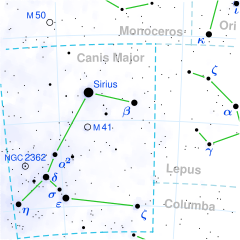الوزن (الكلب الأكبر)
الوزن وفي الفلك الحديث (بالإنجليزية: Wezen) [10] مشتق من العربية ويسمى عند العرب أيضاً أحد العذارى أو دلتا الكلب الأكبر هو نجم أبيض أصفر عملاق ضخم من النوع F[3] يقع في اتجاه كوكبة كوكبة الكلب الأكبر على بعد 1600 سنة ضوئية (490 فرسخ فلكي) من الشمس.[1] وهو ثالث ألمع نجم في الكوكبة بعد الشعرى اليمانية والعذارى قدرة الظاهري +1.83.[2] وقدرة الحقيقي –6.86 .[6]
| الوزن | |
|---|---|
موقع النجم في الكوكبة (الدائرة)
| |
| معلومات الرصد حقبة J2000 اعتدالان J2000 |
|
| كوكبة | كوكبة الكلب الأكبر |
| مطلع مستقيم | 07سا 08د 23.48608ث[1] |
| الميل | −26° 23′ 35.5474″[1] |
| القدر الظاهري (V) | 1.824[2] |
| الخصائص | |
| نوع الطيف | F8 Ia[3] |
| U−B مؤشر اللون | +0.584[2] |
| B−V مؤشر اللون | +0.691[2] |
| نوع التغير | ؟[4] |
| القياسات الفلكية | |
| السرعة الشعاعية (Rv) | 34.3 ± 0.9[5] كم/ث |
| الحركة الخاصة (μ) | –3.12[1]+3.31[1] |
| التزيح (π) | 2.03 ± 0.38[1] د.ق |
| البعد | approx. 1٬600 س.ض (approx. 490 ف.ف) |
| القدر المطلق (MV) | –6.86[6] |
| تفاصيل | |
| كتلة | 16.9 ± 1.6[3] ك☉ |
| نصف قطر | 215 ± 66[7] نق☉ |
| إضاءة | 82,000[6] ض☉ |
| جاذبية سطحية (log g) | 1.00 ± 0.14[3] سم.غ.ثا |
| درجة الحرارة | 6,390 ± 150[3] ك |
| معدنية [Fe/H] | 0.24[8] dex |
| سرعة الدوران (v sin i) | 25[9] كم/ثا |
| عمر | 12[3] م.سنة |
| تسميات اخرى | |
| Wezen, Wesen, Wezea, Alwazn, Al Wazor, 25 Canis Majoris, CD −26° 3916, FK5 273, HD 54605, HIP 34444, HR 2693, SAO 173047. | |
| قاعدة بيانات المراجع | |
| سيمباد | بيانات |
| تعديل مصدري - تعديل | |
خصائص
عدلنجم الوزن نجم عملاق من التصنيف F8 أكبر من الشمس بحوالي 215 مرة ودرجة حرارة سطحه حوالي 5,818 كلفن،[11] وتقدر كتلتة بنحو 17 كتلة شمسية.[3] نجم الوزن ساطع للغاية من القدر –6.86 .[6] وضياؤة يعادل 82,000 ضياء شمسي[6] وإذا كان نجم الوزن أقرب إلى الأرض حيث يكون على بعد الشعرى اليمانية، فإنه سيكون ساطع في سماء الأرض كنصف القمر المكتمل.[12]
يدور نجم الوزن بسرعة تقدر بحوالي 28 كم/ثانية حول نفسة، وبالتالي فأنة قد يستغرق سنة ليكمل دورة كاملة حول نفسة. ويقدر عمرة بحوالي 10 ملايين سنة فقط، وقد توقف عن صهر الهيدروجين في نواتة. وبداء غلافة الخارجي بالتوسع وفي نفس الوقت تناقصت درجة حرارته وخلال 100000 سنة مقبلة سوف يتحول إلى عملاق أحمر ضخم وتصهر نواتة عناصر أثقل . وحالما تكون نواتة مكونة من الحديد سوف ينهار وينفجر كمستعر أعظم.[13]
مراجع
عدل- ^ ا ب ج د ه و van Leeuwen، F. (نوفمبر 2007). "Validation of the new Hipparcos reduction". Astronomy and Astrophysics. ج. 474 ع. 2: 653–664. arXiv:0708.1752. Bibcode:2007A&A...474..653V. DOI:10.1051/0004-6361:20078357.
- ^ ا ب ج د Gutierrez-Moreno، Adelina؛ وآخرون (1966). "A System of photometric standards". Publ. Dept. Astron. Univ. Chile. Publicaciones Universidad de Chile, Department de Astronomy. ج. 1: 1–17. Bibcode:1966PDAUC...1....1G.
- ^ ا ب ج د ه و ز Lyubimkov، Leonid S.؛ وآخرون (فبراير 2010). "Accurate fundamental parameters for A-, F- and G-type Supergiants in the solar neighbourhood". Monthly Notices of the Royal Astronomical Society. ج. 402 ع. 2: 1369–1379. arXiv:0911.1335. Bibcode:2010MNRAS.402.1369L. DOI:10.1111/j.1365-2966.2009.15979.x.
- ^ Koen، Chris؛ Eyer، Laurent (2002). "New periodic variables from the Hipparcos epoch photometry". Monthly Notices of the Royal Astronomical Society. ج. 331 ع. 1: 45–59. arXiv:astro-ph/0112194. Bibcode:2002MNRAS.331...45K. DOI:10.1046/j.1365-8711.2002.05150.x. ISSN:0035-8711.
- ^ Evans، D. S. (20–24 يونيو 1966). Batten، Alan Henry؛ Heard، John Frederick (المحررون). "The Revision of the General Catalogue of Radial Velocities". Determination of Radial Velocities and their Applications. University of Toronto: International Astronomical Union. ج. 30: 57. Bibcode:1967IAUS...30...57E.
{{استشهاد بدورية محكمة}}: الوسيط غير المعروف|عنوان الكتاب=تم تجاهله (مساعدة) - ^ ا ب ج د ه Arellano Ferro، A.؛ Giridhar، S.؛ Rojo Arellano، E. (أبريل 2003). "A Revised Calibration of the MV-W(O I 7774) Relationship using Hipparcos Data: Its Application to Cepheids and Evolved Stars". Revista Mexicana de Astronomía y Astrofísica. ج. 39: 3–15. arXiv:astro-ph/0210695. Bibcode:2003RMxAA..39....3A.
- ^ Davis، J.؛ وآخرون (أكتوبر 2007). "The Emergent Flux and Effective Temperature of δ Canis Majoris". Publications of the Astronomical Society of Australia. ج. 24 ع. 3: 151–158. arXiv:0709.3873. Bibcode:2007PASA...24..151D. DOI:10.1071/AS07017.
{{استشهاد بدورية محكمة}}: صيانة الاستشهاد: postscript (link) - ^ Prugniel، Ph.؛ Vauglin، I.؛ Koleva، M. (يوليو 2011). "The atmospheric parameters and spectral interpolator for the MILES stars". Astronomy & Astrophysics. ج. 531: A165. arXiv:1104.4952. Bibcode:2011A&A...531A.165P. DOI:10.1051/0004-6361/201116769.
{{استشهاد بدورية محكمة}}: صيانة الاستشهاد: postscript (link) - ^ Bernacca، P. L.؛ Perinotto، M. (1970). "A catalogue of stellar rotational velocities". Contributi Osservatorio Astronomico di Padova in Asiago. ج. 239 ع. 1: 1. Bibcode:1970CoAsi.239....1B.
- ^ "IAU Catalog of Star Names". مؤرشف من الأصل في 2018-07-07. اطلع عليه بتاريخ 2018-01-31.
{{استشهاد ويب}}:|archive-date=/|archive-url=timestamp mismatch (مساعدة) - ^ Davis، J.؛ Booth، A. J.؛ Ireland، M. J.؛ Jacob، A. P.؛ North، J. R.؛ Owens، S. M.؛ Robertson، J. G.؛ Tango، W. J.؛ Tuthill، P. G. (2013). "The Emergent Flux and Effective Temperature of δ Canis Majoris". Publications of the Astronomical Society of Australia. ج. 24 ع. 3: 151. arXiv:0709.3873. Bibcode:2007PASA...24..151D. DOI:10.1071/AS07017.
- ^ Ridpath، Ian؛ Tirion، Will (2003). The Monthly Sky Guide. Cambridge University Press. ص. 16. ISBN:0-521-53306-6. مؤرشف من الأصل في 2020-03-04.
- ^ Kaler، James B. "Wezen". Stars website. University of Illinois. مؤرشف من الأصل في 2017-09-08. اطلع عليه بتاريخ 2010-05-28.
